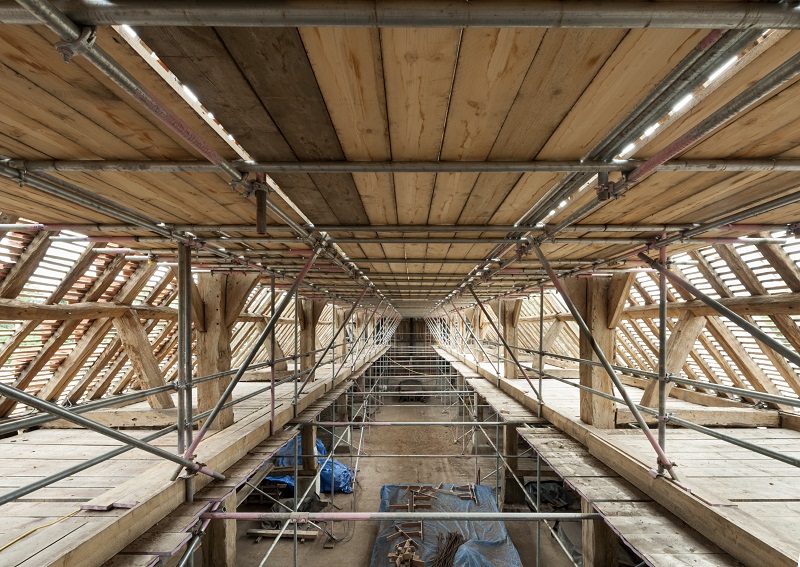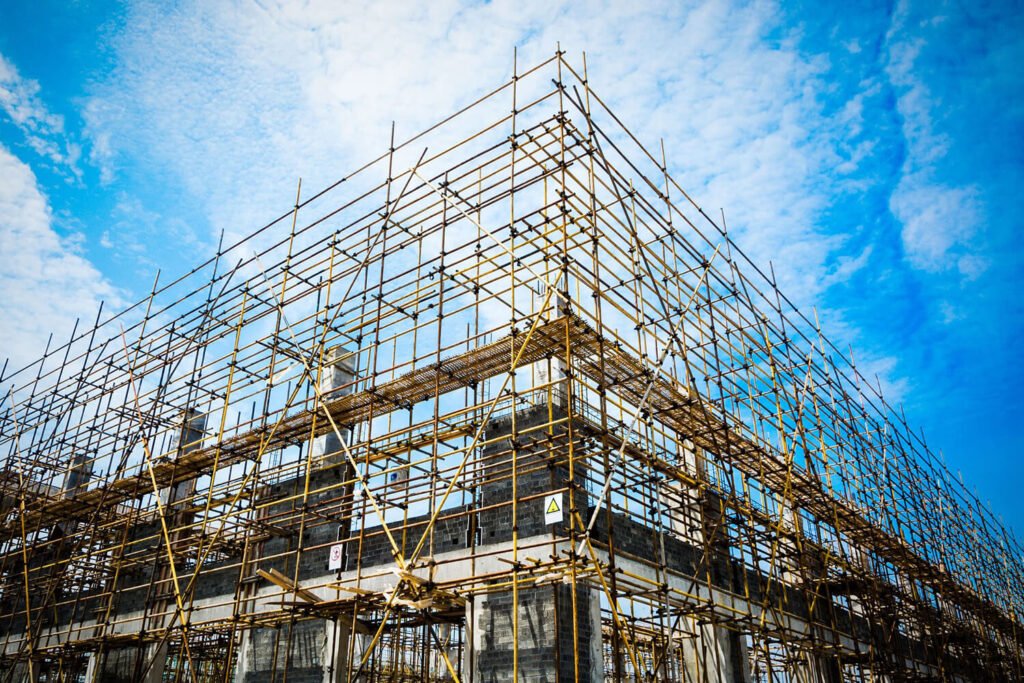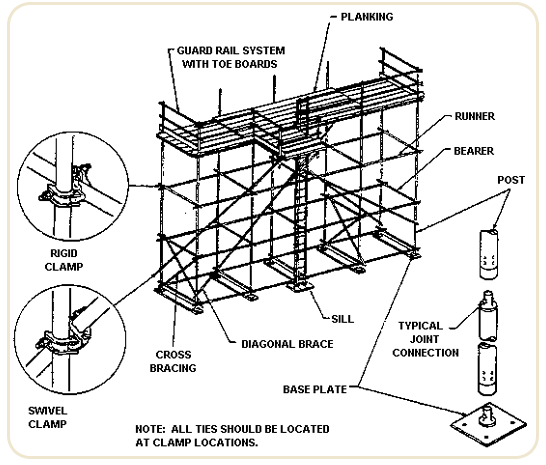Temporary Roof Scaffolding for Your Construction or Renovation Project
Temporary Roof Scaffolding for Your Construction or Renovation Project
Blog Article
Checking Out the Numerous Kinds of Scaffolding Made Use Of in Building And Construction Jobs
The building industry counts heavily on various types of scaffolding to fulfill certain project demands, each offering distinctive benefits and applications. Traditional structure scaffolding supplies a sturdy structure for general tasks, while put on hold scaffolding is important for work on skyscraper frameworks.

Standard Structure Scaffolding
Standard frame scaffolding is just one of the most extensively used techniques in the building market because of its robustness and flexibility. This system includes upright and straight frames that are set up to produce a stable platform for employees and products. The primary parts consist of upright articles, straight journals, and angled dental braces, which with each other provide a solid structure that can support substantial tons.
Among the crucial advantages of traditional framework scaffolding is its versatility to numerous building tasks, varying from household structures to huge business frameworks. The modular design permits very easy setting up and disassembly, making it reliable for both long-lasting and short-term projects. Additionally, the system can be personalized in height and size, suiting various structure designs and site conditions.
Security is paramount in scaffolding applications, and traditional framework systems are furnished with guardrails and toe boards to stop falls and guarantee employee security. Normal inspections and adherence to safety and security policies are important in preserving the integrity of the scaffold (Scaffolding). On the whole, conventional structure scaffolding stays a basic option in the building and construction market, supplying a reputable system for labor and boosting general job performance

Suspended Scaffolding
Put on hold scaffolding uses a distinct solution for construction projects that require access to elevated surface areas, particularly in situations where typical structure scaffolding might be not practical. This kind of scaffolding is normally suspended from the roofing system or top levels of a framework, utilizing a system of ropes, pulleys, and platforms to develop a working room that can be changed to numerous heights.
Among the primary benefits of put on hold scaffolding is its adaptability. It can be easily rearranged or decreased to suit adjustments in construction needs, making it ideal for jobs such as home window setup, frontage job, and maintenance on high-rise structures. Additionally, the very little footprint of suspended scaffolding permits for much better usage of ground space in city atmospheres, where room is typically minimal.
Security is a critical factor to consider in the usage of put on hold scaffolding. On the whole, suspended scaffolding provides a effective and efficient service for accessing hard-to-reach areas in numerous construction situations, boosting both productivity and safety and security on website.
System Scaffolding
System scaffolding, typically considered a contemporary remedy in the scaffolding industry, contains pre-engineered parts that can be promptly set up and adjusted for different building and construction tasks. Scaffolding. This sort of scaffolding is defined by its modular layout, which enables versatility and effectiveness on work sites, fitting structural demands and different elevations
Commonly made from high-strength steel or light weight aluminum, system scaffolding provides enhanced durability and security. The parts consist of upright articles, straight journals, and diagonal dental braces, which adjoin safely, ensuring a robust structure. The layout often includes standardized fittings, simplifying setting up and disassembly procedures, consequently lowering labor time and expenses.

Rolling Scaffolding
Moving scaffolding is a flexible alternative to conventional set scaffolding, designed for his response movement and convenience of usage on building and construction websites. This kind of scaffolding includes a system sustained by frameworks with wheels, allowing workers to easily relocate it as needed. The mobility feature dramatically enhances performance, as it minimizes downtime connected with constructing and dismantling taken care of scaffolding.
Typically created from lightweight products such as light weight aluminum or steel, rolling scaffolding offers a sturdy yet mobile solution for jobs calling for frequent repositioning - Scaffolding. It is especially helpful in tasks such as paint, drywall installation, and electrical work, where access to numerous heights and locations is necessary
Safety is paramount in rolling scaffolding style, with features such as securing wheels to avoid unintentional motion when being used, and guardrails to shield employees from drops. In addition, lots of models are adjustable in height, fitting numerous job requirements.
Cantilever Scaffolding

The style of cantilever scaffolding typically involves making use of braces or arms secured to a building or framework, making it possible for the system to expand exterior securely. Safety and security is extremely important; thus, these scaffolds have to be crafted to endure numerous tons and environmental conditions. Routine inspection and maintenance are crucial to make sure structural honesty and worker security.
Cantilever scaffolding is favored for its convenience and reliable use of area, making it a preferred option in city settings where room restraints prevail. It helps with much easier accessibility to high elevations, eventually contributing to the total effectiveness of building and construction tasks. As with all scaffolding types, proper training and adherence to safety and security standards are crucial for workers utilizing cantilever scaffolding.
Final Thought
In verdict, the varied kinds of scaffolding utilized in building and construction projects each serve distinct functions customized to service scaffolding particular website demands. Typical frame scaffolding supplies stability, while put on hold scaffolding provides versatility for elevated tasks. System scaffolding facilitates quick assembly, and rolling scaffolding enhances wheelchair for differing workplace. Cantilever scaffolding properly attends to challenges in metropolitan setups. Comprehending these scaffolding kinds is crucial for optimizing security and productivity in construction, inevitably contributing to the successful completion of projects.
Standard structure scaffolding provides a tough foundation for basic tasks, while put on hold scaffolding is essential for job on skyscraper frameworks.Moving scaffolding is a functional choice to typical set scaffolding, developed for flexibility and ease of use on construction sites. As with all scaffolding types, appropriate training and adherence to safety and security criteria are vital for workers next page utilizing cantilever scaffolding.
Conventional frame scaffolding gives security, while put on hold scaffolding provides convenience for elevated tasks. System scaffolding helps with fast setting up, and rolling scaffolding improves wheelchair for varying work environments.
Report this page